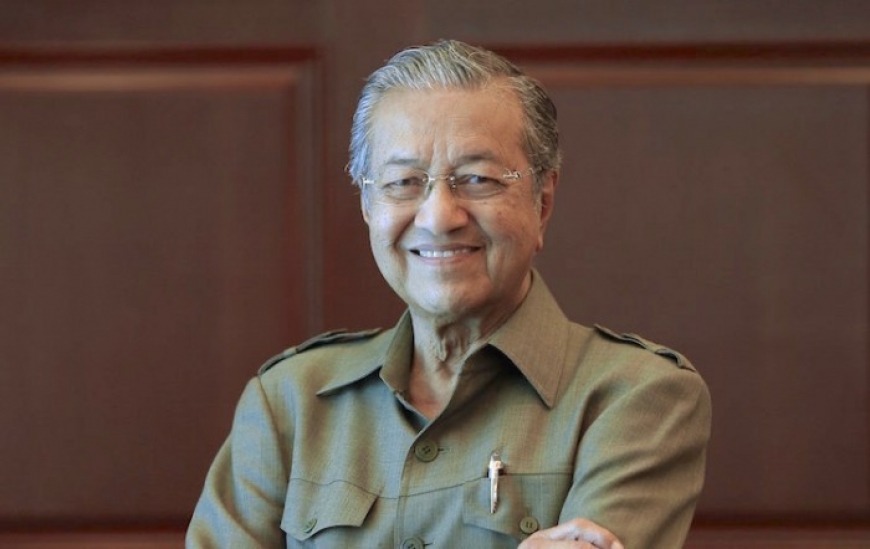Having Integral Vision
Having integral vision simply means having the ability to see through the mind’s eye what the physical eyes are unable to see. It involves having the inherent ability to recognize patterns that are beginning to emerge but are yet very much shrouded in uncertainty. Dr Mahathir has always demonstrated an uncanny ability to be able to see how things will unfold and recognize the changing faces of reality.
He recognized this in the early 1980’s when he first became prime minister and managed to steer the country away from economic collapse through very firm and decisive action. Gradually he built a framework for national development based on what was required at that time. Dato Seri Najib on the other hand could only see what lies ahead but could not foresee the long-term consequences of his actions. As a leader he kept harping on what successes he has brought the country but failed to decipher the enormity of the disdain the people had for him.
Sensing that the county was headed towards an economic meltdown with the shenanigans of the present government, Dr Mahathir took it upon himself to do whatever it takes to save the nation, even if it meant losing at the polls.
His integral vision enabled him to see winning and losing at the polls to be two sides of the same coin and this made him ready to confront the ruling party without fear of loss. He could very clearly see how insignificant his loss would be compared to the collapse of the entire Malaysian economy if the ruling party won. The ability to foresee this and consequently act in accordance with the right thing to do is what having an integral vision is all about.
Capitalizing on insight
According to Debashis Chatterjee, the difference between a soldier and the warrior is that a soldier fights with his sight but a warrior fights with insight. Every leader possesses sight but not all leaders possess insight, which is like an instant flash of lightning that reveals almost instantaneously, an entirely new reality. This new reality comes not from memory or programmed thoughts but is instead tapped from a vast reservoir of awareness of a situation or consciousness at hand. Having insight means being able to sense the reality and discard the false sense of security surrounding a decision or action taken. What is more important than having insight is what you do with it.
Dr Mahathir capitalized on his insights by communicating very articulately to a group of voters what reality lies ahead and, in the process, very effectively changing their perception. He was able to harness a sense of insecurity around the existing policies that were being formulated as being “beneficial” to the masses. His in-depth awareness of the tense situation the country was in and how it was becoming increasingly toxic with time enabled him to set aside differences and form a coalition of people who could synergize efforts to overthrow what was perceived as having outlived its usefulness.
Datuk Seri Najib Razak seemed to preoccupied with building relationships with people in power and seeking and distributing funds in order to stay in the limelight. He could see that people wanted economic support and the country needed funds to grow. However, he did not seem to be able to articulate in his mind the dire consequences the new reality posed on the wellbeing of the country as a whole.
He fought based on what he saw was the right thing to do, unlike Dr Mahathir who acted based on his insights that told him what to do. Between the two, it appears that followers readily follow someone who possesses the insights needed to move ahead in a world that is increasingly uncertain and volatile.
Adopting a servant leadership approach
Leadership comes not from control of resources but from serving human resources that creates those resources. Leaders like Datuk Seri Najib Razak sought to control whatever resources he had. He demanded authority in return for favors done. He found solace in renting out power to subordinates in exchange for subservience. Essentially leaders who subscribe to the notion of command and control are mired in the belief that as long as you are in control, you will remain in control.
However, leaders who propagate such thinking cannot lead for long. Their leadership style, premised on command and control approach breeds dependence on whatever is controlled. In the case of Najib Razak, he used his position as the president of his party money to control the masses and to maintain himself in power. As a result, his ability to lead was dependent primarily on the extent to which Malaysians were convinced that “cash is king”. However, most Malaysians who were reeling in discontent with policies introduced by the government became obnoxious to the concept of “cash is king” altogether.
Dr Mahathir could sense that he had to be perceived as someone who could serve the long term best interest of people who were oppressed. His debunked the “cash is king” philosophy as a myth and emboldened the masses to seek out the truth behind the enormous investigations being levied against head of the government of Malaysia.
He could sense that Malaysians desperately needed a leader willing to serve their needs unconditionally despite facing immense criticism and who faced the prospect of losing everything he spent his lifetime developing in the event he lost.
Such a willingness to sacrifice everything for the good of the nation struck a deep chord in the consciousness of followers who whole heartedly threw their support behind him. The leader who serves the needs of the people and is perceived as an instrument that delivers the wishes of the masses is a servant leader who puts service above self.
Emphasizing the need for accountability
Whilst accountability became increasingly nonexistent under the Najib administration, Dr Mahathir rallied the need for it to be institutionalized. His insistence that all people have to accountable for their actions, including politicians was something most Malaysians welcomed wholeheartedly.
His call for leaders to exercise ownership for their actions and consequences that emerge from these actions resonated with the masses. Only when leaders take ownership of all that happens under their watch, others under the chain of their command will emulate ownership leading to a culture of accountability which was something Malaysia lacked as it became increasing embroiled in one scandal after another.
Malaysians have witnessed a historic moment in their lifetime. They have witnesses what they perceive as the triumph of truth over falsehood, of transparency over secrecy and of honesty over deceit. More importantly, they have been able to witness first-hand how leaders who exhibit integral vision, capitalize on insight and adopt a servant leadership approach can win against all odds, always.
Purely from a leadership development perspective what we can take away from this is that leaders today need to cast away the mindset that command and control style still works. It simply does not. Not in politics and not in business. Leaders have to wholeheartedly embrace the concept of servant leadership to be truly considered a leader who cares.
Building on expertise and experience to develop insights is crucial but more crucial than this is to develop the innate ability to relentlessly inspire others to believe in what the leader wants them to believe. This becomes possible only when leaders themselves take ownership of the decisions they make and work hard in developing a culture of accountability. Having an integral vision helps a great deal because that is what helps a leader do what is expected to be done, to lead.
Asst Prof Dr Rumesh Kumar PMP






